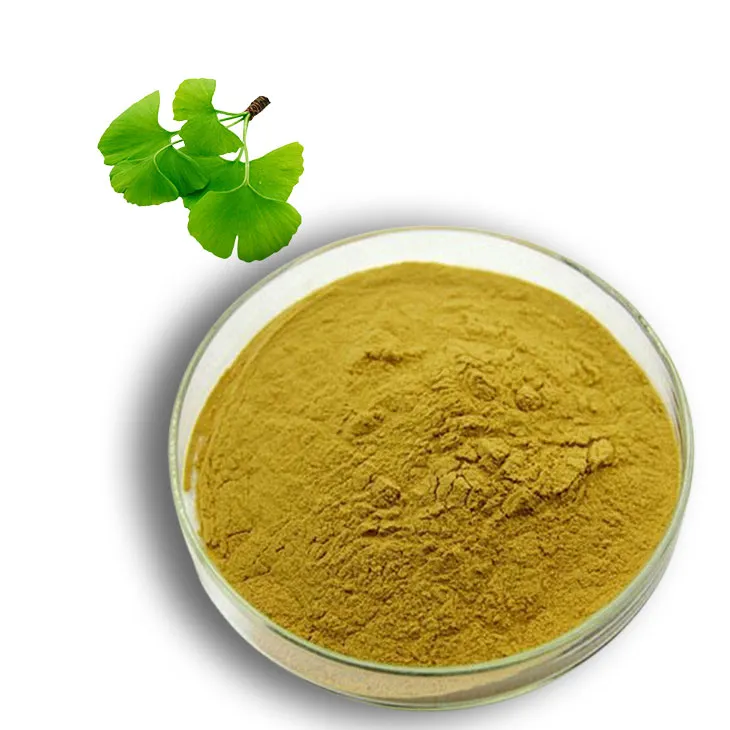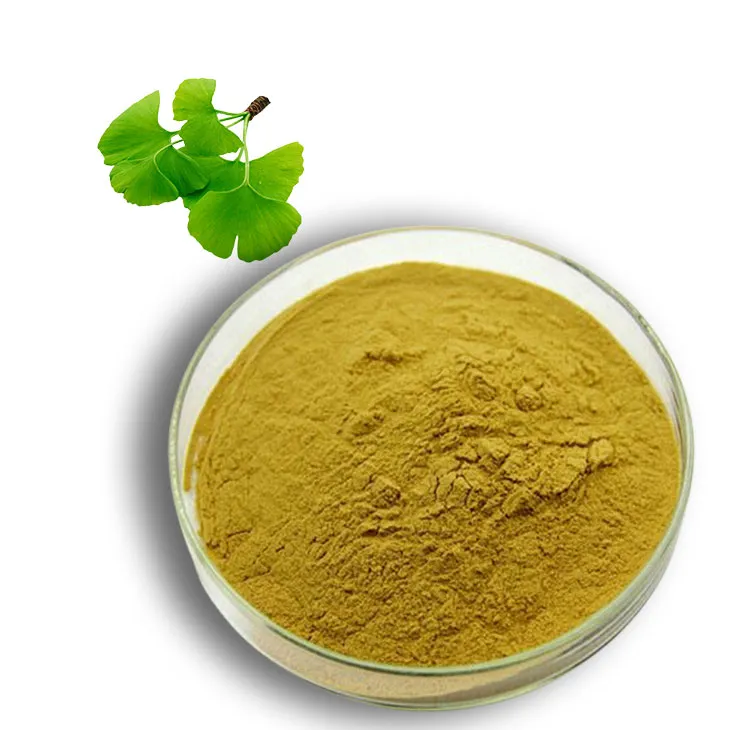- 0086-571-85302990
- sales@greenskybio.com
The best ginkgo biloba extract in nature.
2024-12-02

Introduction to Ginkgo biloba
Ginkgo biloba, often referred to as a "living fossil," has a truly remarkable presence in the plant kingdom. It has survived for millions of years, and its unique characteristics have made it a subject of great interest, especially in the realm of medicine.
In traditional medicine systems around the world, Ginkgo biloba has held a prominent place. For centuries, it has been used to treat a variety of ailments. Its longevity and continued use are a testament to its potential value in promoting health and well - being.

Components of Ginkgo biloba Leaf Extract
The extract obtained from Ginkgo biloba leaves is a rich source of bioactive compounds. Two major groups of compounds are particularly important:
Flavonoids
Flavonoids are a diverse group of polyphenolic compounds. In Ginkgo biloba extract, they play a crucial role in many of the plant's beneficial effects.
- They contribute to the antioxidant activity of the extract. By scavenging free radicals, flavonoids help protect cells from oxidative damage, which is associated with a variety of diseases and aging processes.
- Flavonoids also have anti - inflammatory properties. Inflammation is a key factor in many chronic diseases, and the presence of flavonoids in Ginkgo biloba extract may help modulate the body's inflammatory response.
Terpenoids
Terpenoids, another significant component of Ginkgo biloba leaf extract, are also involved in several important functions:
- Some terpenoids are known to improve blood circulation. This is especially beneficial for the heart and brain, as proper blood flow is essential for their normal function.
- They may also play a role in protecting nerve cells. This is of particular interest in the context of neurodegenerative diseases, where nerve cell damage is a central problem.

Health Benefits of Ginkgo biloba Leaf Extract
Improvement in Blood Circulation
One of the most well - known benefits of Ginkgo biloba leaf extract is its ability to enhance blood circulation.
- At the cardiovascular level, it helps to dilate blood vessels. This dilation allows for a smoother flow of blood, reducing the workload on the heart. It can also help in preventing the formation of blood clots, which are a major risk factor for heart attacks and strokes.
- In terms of cerebral blood flow, Ginkgo biloba extract is beneficial for the brain. Improved blood circulation in the brain can enhance cognitive function, as it ensures that brain cells receive an adequate supply of oxygen and nutrients.
Antioxidant Properties
As mentioned earlier, the flavonoids and terpenoids in Ginkgo biloba extract contribute to its antioxidant capabilities.
- Free radicals are highly reactive molecules that can damage cells, DNA, and proteins in the body. By acting as antioxidants, the compounds in Ginkgo biloba extract neutralize these free radicals, thereby reducing the risk of cell damage.
- This antioxidant activity is associated with a lower incidence of chronic diseases such as cancer, heart disease, and neurodegenerative disorders. For example, in the case of neurodegenerative diseases, oxidative stress is thought to play a significant role in the progression of the disease, and the antioxidant properties of Ginkgo biloba extract may help slow down this process.
Enhancement of Cognitive Function
Ginkgo biloba leaf extract has been studied extensively for its potential to improve cognitive function.
- It may enhance memory. In both animal and human studies, there have been indications that Ginkgo biloba extract can improve memory performance, especially in tasks related to short - term memory and learning.
- Concentration and attention can also be positively affected. This is particularly relevant in today's fast - paced world, where distractions are abundant. By improving concentration, Ginkgo biloba extract may help individuals be more productive and focused.
- There is also some evidence suggesting that it may have a role in preventing or delaying the onset of neurodegenerative diseases such as Alzheimer's and Parkinson's. The extract's ability to protect nerve cells and improve blood flow to the brain are factors that may contribute to this potential benefit.

Research on Ginkgo biloba in Treating Neurodegenerative Diseases
Neurodegenerative diseases are a major global health concern, and Ginkgo biloba extract has been the subject of numerous research studies in this area.
Alzheimer's Disease
Alzheimer's is a progressive neurodegenerative disorder characterized by memory loss and cognitive decline.
- Some studies have suggested that Ginkgo biloba extract may improve cognitive symptoms in patients with Alzheimer's. It may work by reducing oxidative stress in the brain, as well as by improving blood flow to areas of the brain affected by the disease.
- However, the results of these studies have been somewhat inconsistent. While some trials have shown positive effects, others have not. More research is needed to fully understand the potential of Ginkgo biloba extract in treating Alzheimer's disease.
Parkinson's Disease
Parkinson's disease is another neurodegenerative disorder, mainly affecting movement control.
- Research on Ginkgo biloba extract in Parkinson's disease is still in its early stages. Some initial findings suggest that it may have a neuroprotective effect, helping to protect the dopamine - producing neurons that are damaged in Parkinson's.
- Nevertheless, like in the case of Alzheimer's, more comprehensive and long - term studies are required to determine the true efficacy of Ginkgo biloba extract in treating Parkinson's disease.

Conclusion
Ginkgo biloba leaf extract, with its rich composition of flavonoids and terpenoids, offers a wide range of potential health benefits. It has been shown to improve blood circulation, possess antioxidant properties, and enhance cognitive function.
While research on its role in treating neurodegenerative diseases is ongoing and has shown some promising results, more conclusive evidence is still needed. Nevertheless, the natural origin of Ginkgo biloba extract makes it an appealing option for those interested in natural remedies for health promotion.
FAQ:
What are the main components in Ginkgo biloba leaf extract?
The main components in Ginkgo biloba leaf extract are flavonoids and terpenoids. These components play important roles in providing various health benefits.
How does Ginkgo biloba extract improve blood circulation?
The flavonoids and terpenoids in Ginkgo biloba extract can dilate blood vessels, reduce blood viscosity, and thus improve blood circulation, which is particularly beneficial for the heart and brain.
What are the antioxidant benefits of Ginkgo biloba extract?
Ginkgo biloba extract has antioxidant properties. It can neutralize free radicals in the body, protecting cells from free - radical damage, which helps maintain the normal function of cells.
Can Ginkgo biloba extract really enhance cognitive function?
Yes, it may enhance cognitive function. The components in Ginkgo biloba extract can help with memory and concentration. However, more research is still needed to fully understand its effects on cognitive function.
Is Ginkgo biloba extract effective in treating neurodegenerative diseases?
Research has been exploring its potential in treating neurodegenerative diseases. While there are some promising findings, at present, it cannot be said that it is a definite treatment. More in - depth research is required.
Related literature
- The Efficacy and Safety of Ginkgo biloba Extract in Health Promotion"
- "Ginkgo biloba Extract: A Review of its Chemical Composition and Pharmacological Effects"
- "Potential of Ginkgo biloba Extract in Neuroprotection"
- ▶ Hesperidin
- ▶ Citrus Bioflavonoids
- ▶ Plant Extract
- ▶ lycopene
- ▶ Diosmin
- ▶ Grape seed extract
- ▶ Sea buckthorn Juice Powder
- ▶ Fruit Juice Powder
- ▶ Hops Extract
- ▶ Artichoke Extract
- ▶ Mushroom extract
- ▶ Astaxanthin
- ▶ Green Tea Extract
- ▶ Curcumin
- ▶ Horse Chestnut Extract
- ▶ Other Product
- ▶ Boswellia Serrata Extract
- ▶ Resveratrol
- ▶ Marigold Extract
- ▶ Grape Leaf Extract
- ▶ New Product
- ▶ Aminolevulinic acid
- ▶ Cranberry Extract
- ▶ Red Yeast Rice
- ▶ Red Wine Extract
-
Red Date Extract
2024-12-02
-
Lotus leaf extract
2024-12-02
-
Dandelion Root Extract
2024-12-02
-
Jujube Extract
2024-12-02
-
Eyebright Extract
2024-12-02
-
Mango flavored powder
2024-12-02
-
Phellodendron Extract
2024-12-02
-
Kidney Bean Extract
2024-12-02
-
Maitake Mushroom Extract
2024-12-02
-
Cat Claw Extract
2024-12-02





















